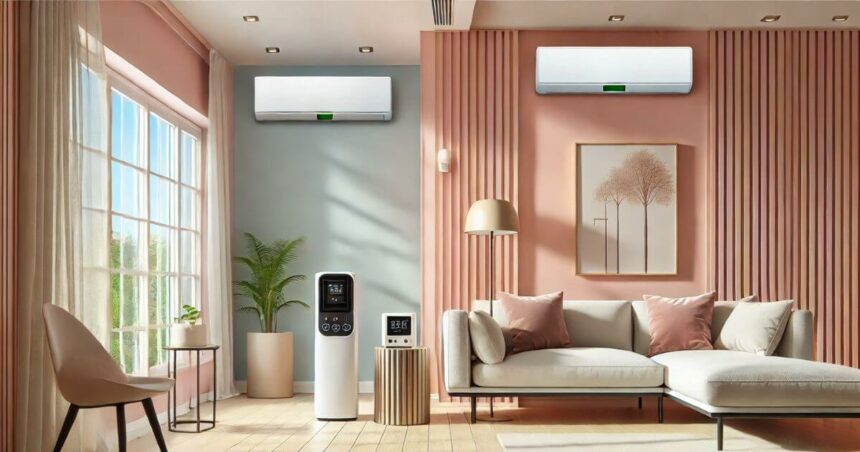The summer season has arrived, along with intolerable heat levels that force people to brave outside temperatures. The ACs and coolers will soon be out. The rapid temperature increase leads to an urgent necessity for air conditioning units. There will be heat waves and humid conditions. For that, people in various parts of the country need suitable air conditioning units to stay comfortable. Picking the perfect air conditioner from the wide selection available proves to be a challenging task. The selection consists of three options: powerful split AC models, budget-friendly window models, or flexible portable cooling systems. Here we are with all the necessary information about picking the right air conditioner to assist you during summer’s arrival.
Which AC Should You Choose?
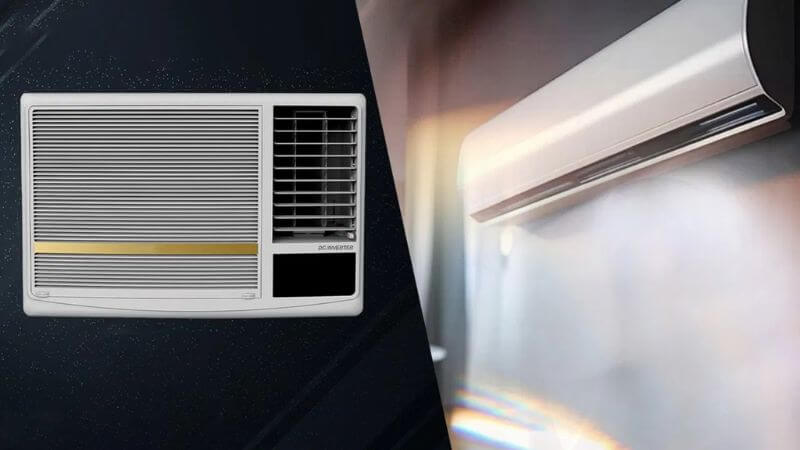
When purchasing an air conditioner, one acquires more than just cooling benefits because it delivers comfort through efficient operation that requires a long-term financial commitment. The type of air conditioning system you choose determines how you will experience its operation, regardless of your room size, financial constraints, or residential instability. We will explain the details of this information step by step.
1. Split AC: The Ideal Choice For Large Rooms And Long-Term Use
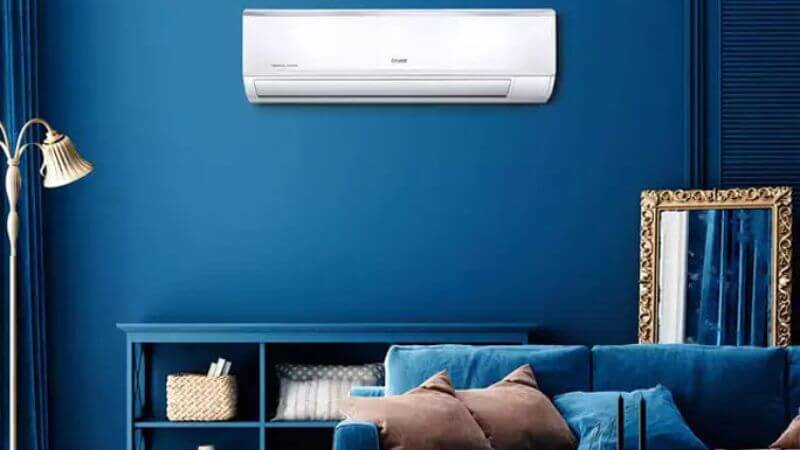
The split air conditioner stands out as an excellent choice since it provides powerful cooling ability for big rooms and promises enduring performance. The two components of these AC units operate separately, with one unit installed indoors and the other positioned outdoors. The separate indoor and outdoor units ensure quiet operation and smooth airflow, making them ideal for bedrooms, living rooms, and office environments.
The energy efficiency advantages of split ACs become even stronger with inverter technology as it maintains cooling according to the room temperature. Although this type of air conditioner has a higher upfront cost than standard options, it proves to be more economical gradually because it reduces electricity usage throughout its operational lifespan and offers extended durability.
2. Window AC: Budget-Friendly And Effective Cooling
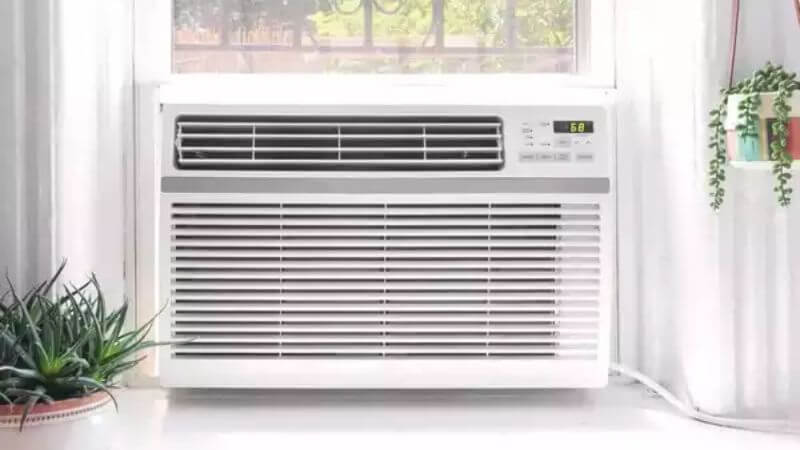
People who are looking for affordable cooling, a window air conditioning system is a suitable option. These self-contained cooling units require installation in windows or wall openings, thus making it easier to install than split ACs.
Window AC units offer excellent performance in areas between 150 to 450 square feet while requiring straightforward installation. Window ACs become the optimal choice for students and renters because they provide effective cooling at a lower cost than split AC units, although they can be noisier during operation.
Maintenance costs for window ACs are also low because all components reside in one unit; thus, servicing operations become simpler compared to split-system ACs.
3. Portable AC: The Flexible Cooling Solution
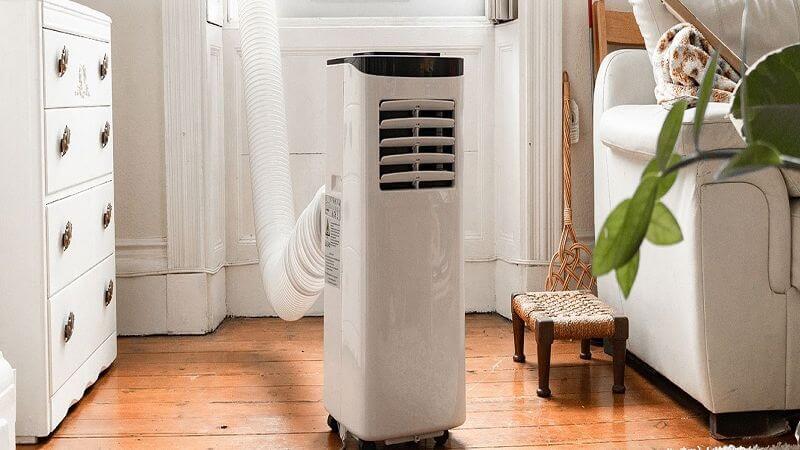
A portable AC is the favorable choice for those who relocate frequently since it can be moved between different areas and does not require permanent installation in rented spaces. It also provides a convenient solution for cooling multiple rooms effectively. Customers can use portable ACs as freestanding units, which they can relocate between different rooms. However, portable ACs require proper ventilation, as they contain an exhaust hose that can be directed out of the window or through a pre-cut hole in the exterior wall.
Split AC – Pros And Cons
Pros:
- Quiet operation – Runs much quieter than window or portable ACs, making it ideal for bedrooms and living rooms.
- Doesn’t block windows – Unlike window ACs, it doesn’t take up space or obstruct natural light.
- Better cooling efficiency – Provides powerful and even cooling, making it suitable for larger rooms.
- Energy-saving options – Inverter models can help reduce electricity bills with long-term use.
- Aesthetic appeal – Sleek design blends well with modern interiors.
Cons:
- Complex installation – Requires wall drilling, wiring, and an outdoor unit, making setup time-consuming.
- Higher installation costs – Professional installation is mandatory, and difficult placements (e.g., terrace mounting) add extra expenses.
- Outdoor unit placement affects efficiency – If placed in direct sunlight, it consumes more power and reduces cooling performance.
- Not always cost-effective – Inverter models save energy only with prolonged use; for short-term usage, savings may be minimal.
- Gas leaks can occur – Refrigerant leaks reduce cooling efficiency and refilling costs ₹2,000–₹4,000. Pollution exposure can worsen wear and tear.
- Regular maintenance is needed – Filters should be cleaned every two weeks, and professional servicing is recommended every six months.
- Expensive repairs – Compressor and circuit board failures lead to high servicing costs compared to window ACs.
Window AC – Pros And Cons
Pros:
- Easier installation – It comes as a single unit, making installation simpler compared to split ACs.
- Affordable option – Generally cheaper than split ACs, both in initial cost and installation.
- Good for small rooms – It provides effective cooling in compact spaces.
- No extra space required for outdoor unit – Unlike split ACs, everything is housed in a single unit.
- Easy to relocate – It can be uninstalled and moved to another room or location more conveniently than split ACs.
Cons:
- Not all windows are suitable – Irregularly shaped or small windows may require modifications, adding to costs.
- Can be noisy – Since the compressor is inside the unit, noise levels may be high, which can be bothersome for light sleepers.
- Blocks light and fresh air – If installed in the only window of a room, it reduces ventilation and natural lighting.
- Security risk – On ground floors, an improperly secured window AC can be a potential entry point for intruders.
- Consumes more power – Most window ACs are non-inverter models, which cycle on and off, leading to higher electricity bills compared to inverter split ACs.
- May require additional support – If the window frame is weak or the AC is heavy, extra brackets might be needed for safe installation.
- Vibrations can be disruptive – Older models tend to vibrate, especially in wooden-framed windows, causing additional noise.
- Noisy compared to split ACs.
- This unit blocks windows fully, thus shutting out both natural light and room ventilation.
- Older versions of air conditioners require higher amounts of electrical power for operation.
If you need a low-cost cooling system, a window air conditioner is an excellent choice.
Portable ACs – Pros And Cons
Pros
- Easy to move – Can be taken to different rooms as needed.
- No outdoor unit required – Unlike split ACs, it doesn’t need an external setup.
- Simple installation – It just needs a window or an outlet for ventilation.
- Great for small spaces – Works well in compact rooms.
Cons
- Needs a window – Hot air must be vented outside, limiting placement options.
- Requires regular drainage – Water collects inside and must be emptied.
- Not suitable for large rooms – Cooling efficiency drops in bigger spaces.
- Heavy and noisy – It weighs over 25 kg and can be as loud as a kitchen exhaust fan.
- Efficiency issues – Window gaps may let hot air in, reducing cooling effectiveness.
- Consumes more power – It uses more electricity while providing less cooling than split or window ACs.
- Hose placement matters – A long or bent exhaust pipe can affect performance and cause overheating.
- Not truly ‘portable’ – Requires a window vent, making frequent relocation inconvenient.
Things To Consider When Selecting An Air Conditioner
The AC selection process involves more than power output since it also affects installation complexity and electric bills while determining future repair expenses. Several critical elements must be considered before deciding on an air conditioner.
- The effectiveness of a small air conditioner decreases when installed in a large room, while using an oversized unit in a small space will raise electric bills through unnecessary power usage.
- Inverter technology-enabled energy-efficient air conditioners work to reduce overall electricity expenses throughout their lifespan. Examine the BEE star rating of any appliance to determine its efficiency level.
- Installing split ACs requires professional help, yet this process is easier with window ACs and portable units because they need less expert assistance for installation and maintenance.
- Customized after-sales service support from established brands with extensive service networks helps avoid maintenance hassles.
- Portable air conditioners serve temporary cooling functions, especially when the installation of stationary units is not possible in residences.
These AC units work suitably for compact areas such as home offices and small living spaces, as well as spaces that require area-specific cooling. The utilization of portable ACs requires room floor space and periodic drainage of accumulated water
Comparison: Split AC Vs Window AC Vs Portable AC
| Feature | Split AC | Window AC | Portable AC |
| Cooling Power | High | Moderate | Low |
| Installation | Complex, needs drilling & outdoor unit | Easy, fits in window | Simple, but needs venting |
| Noise Level | Low | High | Medium |
| Energy Efficiency | High (Inverter models) | Moderate | Low |
| Space Requirement | Needs wall & outdoor space | Requires a window | Needs floor space near a window |
| Maintenance | Expensive, needs regular servicing | Low, easier to maintain | Requires frequent water drainage |
| Portability | Fixed | Fixed | Can be moved |
| Ideal For | Large rooms, permanent homes | Small to medium rooms | Rented spaces, small rooms |
People need to select their AC appliances based on their requirements in combination with financial resources and upcoming domestic developments. You will have an enjoyable summer without regret by selecting a split AC for its power and silence or a window AC for its affordability, alongside effectiveness or a portable AC for its flexibility.
Follow Us: Facebook | X | Instagram | YouTube | Pinterest



